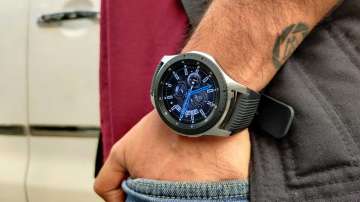Researchers have developed a thin adhesive film that could upgrade a consumer smartwatch into a powerful health-monitoring system. The system looks for chemical indicators found in sweat to give a real-time snapshot of what's happening inside the body.
According to the study, published in the journal of Science Advances, the researchers engineered a disposable, double-sided film that attaches to the underside of a smartwatch.
The film can detect molecules such as metabolites and certain nutrients that are present in body sweat in very tiny amounts. They also built a custom smartwatch and an accompanying app to record data.
"The inspiration for this work came from recognizing that we already have more than 100 million smartwatches and other wearable tech sold worldwide that have powerful data collection, computation and transmission capabilities," said study leader Sam Emaminejad from the University of California, Los Angeles (UCLA).
"Now we have come up with a solution to upgrade these wearables into health-monitoring platforms, enabling them to measure molecular-level information so that they give us a much deeper understanding of what's happening inside our body in real time," Emaminejad added.
According to the researchers, the skin-touching side of the adhesive film collects and analyses the chemical makeup of droplets of sweat. The watch-facing side turns those chemical signals into electrical ones that can be read, processed and then displayed on the smartwatch.
The study revealed that the researchers tested the film on someone who was sedentary, someone doing office work and people engaged in vigorous activity, such as boxing, and found the system was effective in a wide variety of scenarios.
They also noted that the stickiness of the film was sufficient for it to stay on the skin and on the watch without the need for a wrist strap for an entire day. Over the past few years, Emaminejad has led research on using wearable technology to detect indicator molecules through sweat.
This latest study shows a new way that such technologies could be widely adopted. "We are particularly excited about our technology because by transforming our smartwatches and wearable tech into biomonitoring platforms, we could capture multidimensional, longitudinal and physiologically relevant datasets at an unprecedented scale, basically across hundreds of millions of people," Emaminejad said.
"This thin sensing film that works with a watch shows such a path forward," he added. While the team designed a custom smartwatch and app to work with the system, the research team said the concept could someday be applied to popular models of smartwatches.
Latest Technology News

